Samsung Galaxy S 2 (International) Review - The Best, Redefined
by Brian Klug & Anand Lal Shimpi on September 11, 2011 11:06 AM EST- Posted in
- Smartphones
- Samsung
- Galaxy S II
- Exynos
- Mobile
WiFi, GPS
The SGS2 has both 2.4 and 5 GHz WiFi connectivity courtesy of Broadcom’s newest combo chip, the BCM4330. It is the logical successor to BCM4329, which we saw adopted darn-well almost universally in the previous generation, from the iPhone 4 to SGS1. BCM4330 still is a single spatial stream combo solution, but what’s different is that alongside Bluetooth 4.0+HS support is an on-chip power amp for 5 GHz WLAN in addition to last gen’s 2.4 GHz power amp (or another version which had both). There’s also still FM receive and transmit support.
That puts SGS2 in an incredibly small list of smartphones that include 5 GHz WLAN support, which is critical going forwards as the 2.4 GHz ISM band gets even more crowded. I’ll spare you my usual rant about how at every conference and trade show 2.4 GHz turns into a completely unusable nightmare.
As with every other radio, we have to do the receive sensitivity dance and make sure nothing is broken. I tested the SGS2 alongside an SGS 4G at my house with both an Airport Extreme (5th Gen) and WRT54G-TM boosted to 184 mW. SGS2 WiFi reception on 2.4 GHz is darn near identical to the previous generation.
There’s something deceptive about this however, and it’s that although Samsung has chosen to go the usual compressed-dynamic-range route with cellular bars, the WLAN bars seem to be more linearized. Thus where I’m used to seeing every other smartphone show max (until you’re right about to fall off), the SGS2 actually doesn’t lie to me and shows fewer bars. Until I ran around and looked at RSSI in dBm, I suspected SGS2 had WLAN sensitivity issues where there don’t appear to be any. One small thing I did notice is that SGS2 (and BCM4330) seems to only connect at long guard interval (eg 65 Mbps maximum for single stream, 20 MHz channels), where SGS1 and BCM4329 connected at 72 Mbps short guard interval.
In practice, actually using the 5 GHz radio on SGS2 is a bit challenging, since Android 2.x has no proper prioritization for 5 GHz over 2.4 GHz when presented with the same SSID running on both bands. I’d obviously like to see the less-crowded 5 GHz band used before the more crowded 2.4 GHz band.
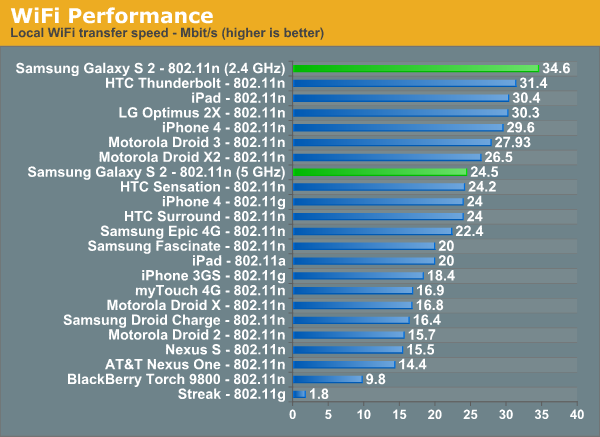
Performance on 2.4 GHz with BCM4330 in SGS2 is scorching, at 34.6 Mbps when downloading a 100+ MB PDF over the local network. On 5 GHz performance drops a bit for some reason.
GPS
To say that SGS1’s GPS was a disaster is a bit of an understatement, at least on the variants that I got my hands on. What’s worse, for a lot of those phones, GPS is still broken to this day. Thankfully Samsung learned from that experience and didn’t make the same mistake twice, and SGS2 has a different GPS entirely and much better time to first fix as a result.
I mentioned it earlier, but SGS2 uses a SiRFstarIV GSD4t GPS this time around. It’s a bit interesting that Samsung is using a discrete GPS considering the fact that Exynos 4210 has its own integrated GPS baseband.
I measured time to a warm fix at around 3–5 seconds with the AGPS data already downloaded, which is pretty in line with modern devices. From a cold start, it’s anywhere between 10–15 seconds, though sometimes faster. I’ve seen faster on some other phones I won’t name, but GPS works this time around, and works well. I took the SGS2 on a 7-hour long road trip with me and used its GPS continually with no issues.
Call Audio
Inside the SGS2 is an Audience 1026 voice processor, which rejects noise which is common between the primary microphone at the bottom of SGS2 and secondary microphone at the top. Discrete noise canceling solutions are pretty par for the course lately, and it’s good to see SGS2 not excluded from that trend.
Inside the SGS2’s excellent ServiceMode menu is an option to enable and disable Audience processing, which naturally we explored. I recorded a call placed from the SGS2 in the presence of very loud background noise with Audience turned on and off, and you can hear the difference between the two, running through the same test. Only at the most extreme ambient volume level is background noise noticeable on SGS2.
Samsung Galaxy S II - Noise Rejection with Audience A1026 by AnandTech
Samsung Galaxy S II - Noise Rejection with Audience A1026 Disabled by AnandTech
Call quality on the SGS2 is a bit more interesting, I placed a test to the local ASOS and recorded it over line-in as we’ve done before. Inside ServiceMenu the device will even show what type of voice coder is used given present network conditions, which is AMR-NB on AT&T.
Samsung Galaxy S 2 - AMR-NB on AT&T by AnandTech
Here the SGS2 doesn’t sound quite as good as other phones I’ve recorded on UMTS, unfortunately.
Speakerphone Volume
Speakerphone is the last thing on the list, and unfortunately at maximum volume during a voice call, the SGS2 doesn't measure extremely well. This is puzzling, since for navigation and other system sounds, the SGS2 is very loud. Clearly something isn't set properly, and the SGS2 has the potential to be louder on speakerphone for calls with appropriate tweaking.
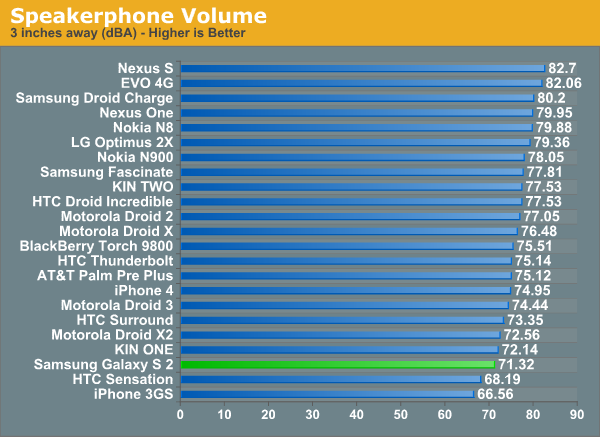


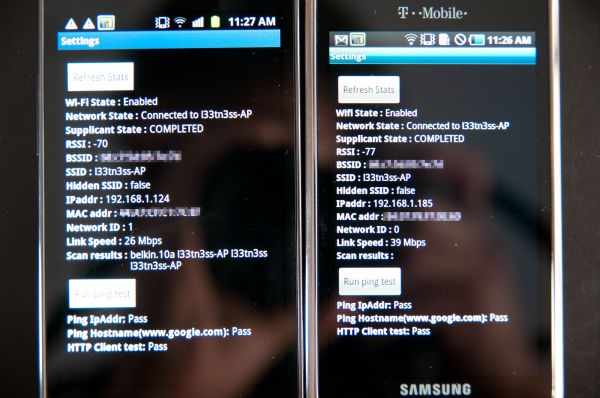
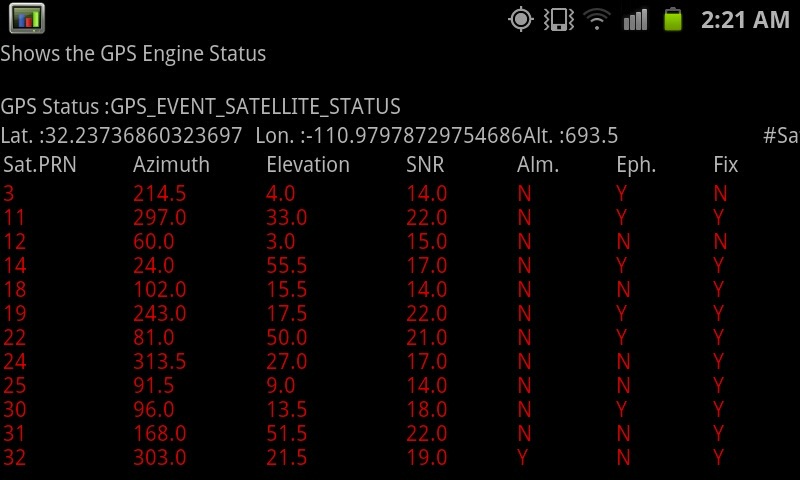
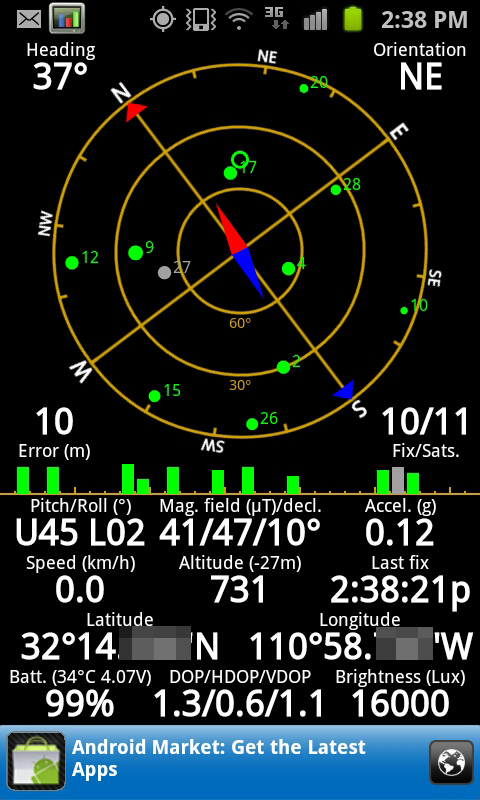








132 Comments
View All Comments
VivekGowri - Sunday, September 11, 2011 - link
I literally cannot wait to read this article, and I similarly cannot wait for SGS2 to launch in the US.ImSpartacus - Sunday, September 11, 2011 - link
You guys don't get early access to drafts?niva - Monday, September 12, 2011 - link
I own an original Galaxy S, until it's been proven that Samsung updates to the latest Android within a month after major releases I will not buy anything but a Nexus phone in the future (assuming I even go with Android). By the time that decision has to be made I'm optimistic there will be unlocked WP7 Nokias available.Havor - Monday, September 12, 2011 - link
Seriously , whats the problem, I was running 2.2 and 2.3 when they came out, could have them sooner, I just dont like to run roms with beta builds.So you never heard of Rooting and Custom Roms?
Its the nature of companies to have long and COSTLY eternal testing routs, done mainly by people with 9 to 5 jobs, as delivering buggy roms is bad for there name, but then so is not updating to but its lots less hurtful, as most people dont care or know any better.
Next to that if your phone is a phone is customized with extra crapeware by your provider it can be that it takes months before you get a update even do Samsung delivered one a long time ago.
The rooting scene is totally different, its done by nerds with passion for what they do, and yes the early/daily builds have bugs but also get mouths quicker reported and fixed by the scene.
And imho are the final updates just as stable as the factory builds.
Dont like how your Android is working?
Stop bitching and fixed your self, its not that hard, as it is a OS platform, just make sure you can root your phone, before you buy it.
The following website explains it all.
http://androidforums.com/galaxy-s-all-things-root/...
http://androidforums.com/galaxy-s-all-things-root/
vision33r - Monday, September 12, 2011 - link
If it's your personal phone, you can do whatever you want. However like some of us here with jobs that let us pick phones. One requirement is the phone has to be stock and no rooting allowed.Samsung is about the worst of the 3 makers in terms of software updates.
niva - Monday, September 12, 2011 - link
Seriously calm down, I've heard plenty about rooting and custom roms but phone hackery is not something I'm interested in right now. I don't have the time or energy for it. I shouldn't have to manually go through rooting and updating my phone, especially when security issues are involved.I like the way 2.2 is working on the SGS. I bought this phone from a friend who upgraded and it's not something I would've paid the retail price for. I've not run into anything so far that's made me actually bother with the rooting and manual upgrade process. I've not read into rooting the phone or updating it, but I'm sure if I get into it this will take me a long time (hours/days) which I shouldn't need to sacrifice to run the latest version of the OS.
From the political standpoint the blame is both on Samsung and T-Mobile apparently in terms of getting the new revisions out.
From my personal standpoint I despise all companies who do not use the default Android distro, running skins and secondary apps, on the phones they ship out. While some of the things they do are nice, it slows down their ability to keep up with android revisions.
On the other hand, my wife's Nexus (original one) updates faster than internet posts saying Android 2.3.x has been rolled out. It's friggin awesome. She had one problem with battery draining really fast after a recent upgrade but I managed to fix that after a couple of hours of forum searching and trying different things.
So it's simple, if I will buy another Android in the future, it will be a Nexus phone, where I know from personal experience that everything works in terms of having the latest and greatest. Notice the Nexus S is made by Samsung, it's for the most part identical to the phone I have, yet gets the updates immediately and doesn't have the known security problems I'm exposed to.
ssj4Gogeta - Monday, September 12, 2011 - link
Well, the international version got 2.3.3 around ~3 months ago here (and earlier for other countries).poohbear - Tuesday, September 13, 2011 - link
vision33r u dont know what you're talking about. People bitch and complaina bout software updates, but how are the quality of those updates? when its updated too soon there are bugs and ppl complain, updated later ppl complain about the wait times. I remember last year Motorola said they're not updating their XT720 to android 2.2., they're leaving it at 2.1. S korea Motorola was the only branch that decided to do it, but guess what? 2.2 was too much for the hardware in the XT720 to handle, and it ran slooooow! XT720 users all over complained about it, but the reality is the phone couldnt handle it. 90% of smartphone users want something stable that works, they dont care about having the latest and greatest Android build. So if Samsung errs on the side of quality and takes more time to release stable quality software, then all the power to them!anishannayya - Friday, September 23, 2011 - link
Actually, if updates are your hard-on, then you'd likely be looking at Motorola in the future (due to the Google acquisition).The entire reason why the Nexus lines of phones are quick to get updates is because the are co-developed with Google. As a result, these phones are the ones the Google developers are using to test the OS. When it is ready to go, it is bug free on the device, so Samsung/HTC can roll it out immediately.
At the end of the day, any locked phone is plagued by carrier bloatware, which is the biggest slowdown in software release. Just buy an unlocked phone, like this one, in the future.
ph00ny - Sunday, September 11, 2011 - link
It's awesome to see this article finallyI'm glad François Simond aka supercurio contributed to the article
Btw that slot on the left is for the hand strap which is very popular in asia for accessory attachments